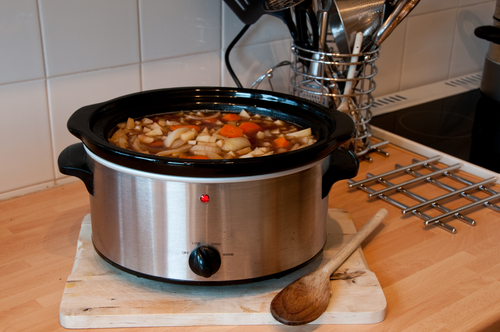 Slow cooker photo from Shutterstock
Slow cooker photo from Shutterstock
A group of Easton residents alongside local MP Stephen Williams will attend a ‘Slow Cooker Masterclass’ organised by Western Power Distribution (WPD), the Centre for Sustainable Energy (CSE) and Easton Energy Group at The Greenbank Pub, Easton on Thursday 7 August from 7pm -9pm. The idea behind the cooking demo is to not only to showcase the variety of flavoursome and frugal foods that can be created using slow cookers, but also how using the device can really help cut energy use at peak demand times. Slow cookers use just a little more energy than a traditional light bulb, so food can be left to cook slowly while you get on with other things, helping to save both time and energy.
At the end of the masterclass, residents will be able to sample the slow cooked dishes, and Stephen Williams MP will present some lucky prize draw winners with free slow cookers to take home.
The masterclass is part of a WPD initiative undertaken as part of the wider energy demand reduction pilot project ‘Less is More’, which rewards residents in Easton for working collectively to reduce electricity usage during peak hours, and is being supported through Ofgem’s Low Carbon Network Fund (LCNF).
Enabled by monitoring WPD installed at the local substation, residents can track the significant impact that small changes such as using slow cookers can have on the community’s energy consumption on a simple interactive website at www.lessismore.org.uk.
Easton residents have already earned over £1,400 as a community since starting ‘Less is More’ just 7 months ago. At the end of the programme, residents will get to spend the reward on something that will benefit the local community; this could include improvements to local facilities or even a neighbourhood street party.
Delivering more than just community rewards for Easton and individual savings for its residents, the project will enable CSE, Easton Energy and the other energy charity partners involved with ‘Less is More’ across the WPD region to determine what approaches work best in encouraging people to use less energy
It will also enable WPD and other distribution network operators to better understand householders’ responses to energy related community engagement. This knowledge will equip the company to find cheaper and more customer-friendly approaches to preparing the electricity grid for the growth of low carbon technologies.
Stephen Williams, MP for Bristol said: “It’s great to see the local residents and businesses in Easton working together to get behind this project. Local energy reduction initiatives like Less is More are a fantastic way of empowering local residents to become more energy efficient and preserving money within the local community. I commend the efforts of WPD, Bristol CSE and Easton Energy for working so hard to develop clever innovative ways to help communities prepare for a zero carbon future”.
Steven Gough, Western Power Distribution said: “We are hugely thankful to all of the residents and volunteers for their time and efforts in supporting Less is More in Easton. It’s rewarding to see the local community in Easton coming together to proactively making changes to lower their energy usage and we look forward to observing the shifts in consumption in Easton in the coming months. Ultimately, the community enthusiasm and impact we are seeing already continues to highlight the importance of WPD’s innovation work in this area.”
Rachel Coxcoon, Centre for Sustainable Energy said: “Working on this campaign is an exciting opportunity to work directly with the local community in Easton to make them more aware of times of high energy demand and to help make their supply more secure. It is great to be working with WPD, local energy charity Easton Energy Group and motivated residents to help reduce their overall consumption, leading to lower bills. The Less is More project provides really useful feedback from the substation monitoring to help us know what’s most effective in terms of demand reduction.”
